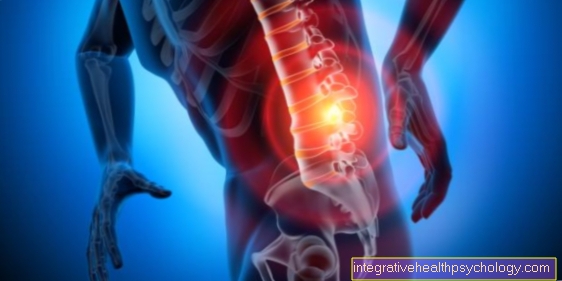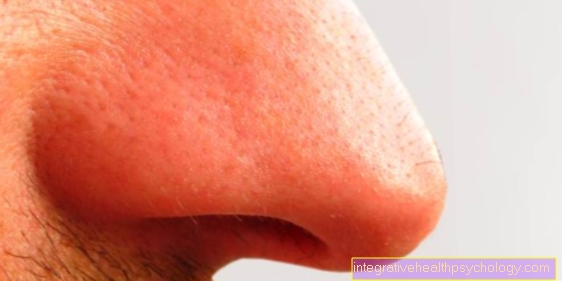Gastric mucosal inflammation symptoms
Synonyms in a broader sense
Medical: gastritis
Gastroenteritis, inflammation of the mucous membranes
Symptoms of inflammation of the stomach lining
Inflammation of the stomach lining (gastritis) is associated with various symptoms, depending on the course of the disease. The chronic form of gastric mucosal inflammation is usually symptom-free for a very long time, as the inflammation only develops slowly.
Read about this too Burning in the upper abdomen

If the disease is already more advanced, a so-called Hunger pains occur. The patients suffer from hunger that is sometimes difficult to endure, but after just a few bites they are full and suffer Bloating.
In addition, diffuse stomach pain, heartburn, a Feeling of pressure in the upper abdomen and indigestion like diarrhea occur. Especially heartburn and Abdominal pain at night can also occur.
The gastric mucosal inflammation has existed for so long that the inflammation increases bleeding erosions the mucous membrane can lead to a Anemia (anemia) occur. This goes hand in hand with paleness, general Feeling weak, fatigue or accidental Weight loss. In general, however, the chronic inflammation of the gastric mucosa is often recognized very late and then major complications such as Bleeding appeared.
The acute gastric mucosal inflammation however, shows very clear and sudden symptoms. Patients suffer from sudden onset nausea and Vomit, acid regurgitation, heartburn, one Feeling of pressure in the upper abdomen as well Pain in the upper abdomen or one unpleasant taste in the mouth. The abdominal pain can also be in the form of Colic occur. These symptoms usually become more pronounced immediately after ingesting food or fluids. Some patients also report an aversion to specific foods that were not known before the disease. Since the upper abdominal pain is also behind the Sternum Some acute gastric mucosal infections will initially become noticeable with one Heart attack mistaken. If the stomach acid causes bleeding, the Gastric mucosa patients may vomit blood or pass it with their stool. Because of the stomach acid, the blood coagulates and therefore becomes black. Doctors then speak of Breaking coffee grounds or. Tarry stool.
stress
Stress can contribute to gastritis Cause and symptom at the same time be. On the one hand, it promotes and maintains the inflammation of the gastric mucosa, on the other hand, gastritis is a nuisance in everyday life and its symptoms can cause severe stress - whether through pain, nausea, vomiting or diarrhea.
In everyday clinical practice, the "Stress gastritis“Spoken: physical stress from serious illnesses, injuries or operations can be caused by the stress on the body and the secretions of Stress hormones like cortisone cause gastric mucosal inflammation, especially if in addition gastric drugs be taken. In general practitioners' practice, it can often be observed that people in situations with great psychological stress have brief stomach upsets. Frequent triggering situations are professional problems, relocations, the sudden need for care of a relative, the loss of a loved one, fears and the like.
Important is, in addition to drug therapy the gastric mucosal inflammation to try To avoid stress in the long term or better to process. For example, various relaxation techniques can be tried out or, if other options fail, psychotherapy can also be initiated.
diarrhea
Diarrhea is a rather rare symptom of gastric mucosal inflammation and occurs mostly in the chronic form on. One speaks of diarrhea only if the person concerned has bowel movements more than 3 times a day and the bowel movements are mushy, thin or runny. The frequency and amount of diarrhea associated with gastric mucosal inflammation differs greatly from person to person. The chair often has one strict, unusual smell.
The diarrhea associated with gastritis can have various causes: The inflammation can cause the food-digesting substances that the stomach produces to be excreted in too small amounts or to work less effectively. This can lead to poor digestion of food components and thus cause diarrhea, which is particularly rich in fat.
Bleeding from the mucous membranes due to inflammation of the stomach lining can also lead to diarrhea. The chair is then often dark. The diarrhea, like all other symptoms, should improve shortly after starting therapy. However, if gastritis has persisted for a long time, it may take a little longer for bowel movements to fully return to normal.
fatigue
Fatigue is a very common state of mind and just morbid, if it occurs very often, severely, or for a long time. It is rarely caused by an inflammation of the gastric mucosa - it is much more likely to be caused by another disease.
Gastritis is usually only the cause of fatigue in the advanced stages of the chronic form of the disease. Then small, unnoticed bleeding often leads to anemia, too anemia called, caused. This leads often to a pallor in addition to tirednesswhich can be noticed first on the mucous membranes, as well as fatigue. Especially with the autoimmune Type A gastritis anemia should be expected: Vitamin B12 can no longer be included here. However, this is necessary for the production of red blood cells.
Another possible cause of abnormal fatigue in gastritis can be pain-related, Insufficient intake of fluids or food be. Therefore, you should ensure that you drink at least 2 liters per day.
Indications as to whether gastritis is responsible for the tiredness is given at the beginning of the temporal context. If it occurred shortly before or after other symptoms of gastric mucosal inflammation or if it does not depend on sleep behavior and the quality of sleep, this speaks for the gastritis as the cause. Other common causes such as sleep disorders and sleep apnea syndrome should always be taken into account and pathological tiredness should be clarified at the latest if it does not go away despite the improvement in the gastric mucosal inflammation.
Circulatory problems occur if the blood pressure drops too much. These include sudden dizziness, a feeling of weakness, "turning black before the eyes" and fainting. Similar to fatigue, these symptoms are not a common symptom of gastritis and occur more likely in later stages of the chronic form, if there is severe pain or bleeding in the stomach. It is important to have a doctor clarify the occurrence of circulatory problems with gastric mucosal inflammation and to examine whether the Blood or vitamin B-12 balance has changed in the body.
To prevent circulatory problems, it makes sense to enough to drink. Healthy people should drink at least 2 liters a day, while athletes or other physically active people should drink more than 3 liters a day.
If those affected notice dizziness or blackening in front of their eyes in good time, they should lie down immediately so that in the event of a collapse, there is no danger of falling. Then the legs should be put up.















.jpg)













